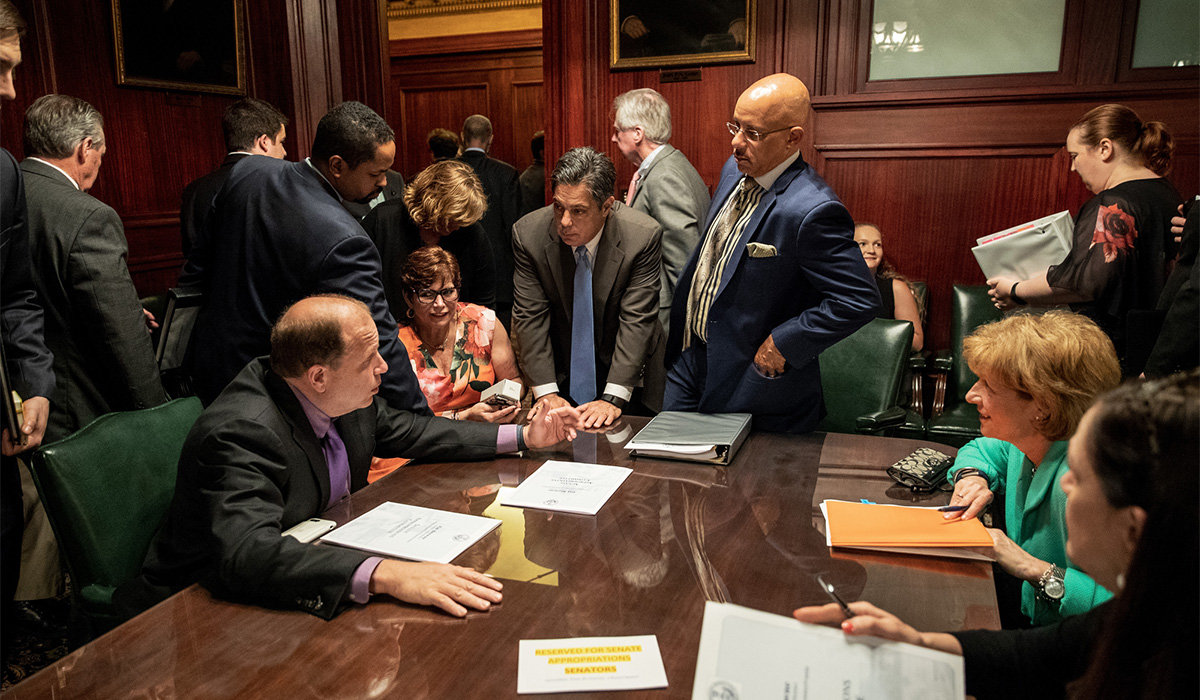PITTSBURGH, PA − June 29, 2018 −In the wake of tragic officer-involved shootings across the commonwealth, and the nation, I am developing and will be introducing legislation to address these situations. I believe it is important that the General Assembly develop and enact legislation that provides improved training for police to know when to use force, particularly deadly force.
 Additionally, it is important that our police receive additional training to promote better relations with the communities they police. Finally, it is important to make available enhanced mental health services to our police and community members. To this end, I am proposing legislation to do the following:
Additionally, it is important that our police receive additional training to promote better relations with the communities they police. Finally, it is important to make available enhanced mental health services to our police and community members. To this end, I am proposing legislation to do the following:
- Create specialized units to respond to crisis situations, including officer-involved shootings, to provide immediate access to mental health counseling for police and community members;
- Develop a statewide database to permit transparency in the hiring police officers; the database will include any disciplinary actions, misconduct or discriminatory policing complaints lodged against law enforcement personnel;
- Require MPOETC to develop a uniform policy on the use of force and deadly force by police officers and direct municipalities that lack such policies to adopt and post the MPOETC uniform policy and require annual updates and training for police officers;
- Create a bipartisan legislative caucus on cultural awareness in policing that can study police activities and make recommendations on improving community police relationships;
- Improve Municipal Police Officer Training to include the following:
-Enhanced classroom and field training on cultural awareness for police recruits and during police training;
-Direct in the training and recertification curriculum, psychological counselling for police officers who may be suffering from PTSD or other similar issues. MPOETC would develop a statewide standard.
HARRISBURG, PA − June 27, 2018 − The PA Senate Dems filed the below cosponsorship memo this afternoon to combat the potential negative impacts of the SCOTUS ruling on Janus vs AFSCME today.
Here’s a statement from Democratic Leader Jay Costa, Jr.
Today’s decision by the U.S. Supreme Court in the Janus case is disappointing, and disheartening for the millions of middle class workers who depend on strong unions to advocate for them in the workplace. This ruling gives employers more leverage, and divides workers amongst themselves. While this is undoubtedly a setback for workers’ rights, it is not and cannot be a death knell for public sector unions. We must do more at the state level to protect the middle class and their rights in the workplace.
HARRISBURG, PA − June 22, 2018 − The Pennsylvania Senate passed the state budget for Fiscal Year 2018-19 (House Bill 2121) by a vote of 47-2.
“In January, the Senate Democratic caucus outlined our priorities for the year and this budget puts the money where our mouths were,” said Senate Democratic Leader Jay Costa, Jr. “It makes major investments in education at every level, workforce development, health care and social justice. It’s the product of months of bipartisan work and compromise, and I’m proud to support a budget that so aptly reflects our values.”
 Senate Democratic Appropriations Chairman Vincent Hughes noted that the budget restores the billion-dollar cuts to education funding under the administration of Gov. Tom Corbett. He added that he is hopeful investments in the people of the commonwealth continue to be of the highest priority.
Senate Democratic Appropriations Chairman Vincent Hughes noted that the budget restores the billion-dollar cuts to education funding under the administration of Gov. Tom Corbett. He added that he is hopeful investments in the people of the commonwealth continue to be of the highest priority.
“The increased investments to education, job and economic initiatives, social justice, and health care in this year’s budget are a testament to what happens when we work together and put the people first,” Senator Hughes said. “On a personal note, I am pleased this budget negotiation ended in a timely fashion and believe this is the foundation for future bipartisan budget negotiations.”
The Senate Democratic Caucus priorities in this budget focus on four categories: education, jobs and workforce development, social justice and health care. The budget incorporates major investments in those state programs, including:
- In education:
- $100 million increase in basic education (K-12 public schools)
- $20 million increase in Pre-K Counts program
- $30 million increase in career and technical education as part of the PA SMART Initiative
- $15 million increase in special education
- $21.6 million increase in Early Intervention
- Nearly $7 million increase to community colleges
- $15 million to the state-owned universities of the PASSHE schools
- In job and workforce development:
- A new $7 million apprenticeship training program through PA SMART
- $3 million increase to industry partnerships through PA SMART
- $3 million increase to combatting the Spotted Lanternfly infestation that threatens our agricultural industry
- In social justice:
- $1.3 million to the Human Relations Commission to provide the resources necessary to investigate claims like those of the Grandview 5.
- $1 million for It’s On Us grants to address campus sexual assault
- In health care
- Includes funding to address the Governor’s waiting list initiatives.
- 100 persons on the emergency waiting list for intellectual disabilities (ID) and 800 high school graduates aging into the ID waiver program.
- 40 adults off of the Autism Intervention and Services waiting list.
- Provides funding to expand home visitation programs for parents and young children.
- $2.5 million to fight Lyme disease
The General Appropriations bill passed in the Pennsylvania House on Wednesday, and now goes to Governor Tom Wolf’s desk to await his signature.
###
HARRISBURG, PA − June 12, 2018 − The Pennsylvania Senate Democrats voted unanimously against a Senator Aument amendment to create judicial districts, as part of the redistricting reform bill, Senate Bill 22.
Ultimately, the amendment passed by a partisan vote of 31 to 18, with several Republicans voting against it as well.
Senate Bill 22 was intended to create an independent commission for the redistricting process, to prevent gerrymandering and ensure fair, competitive elections. The irony and hypocrisy of the amendment from Senator Aument is that its purpose is to gerrymander the court system. It would create commission-drawn districts for judges – instead of statewide elections, as they are now.
“This amendment hijacked a well-intentioned bill to restore public faith in government,” said Senate Democratic Leader Jay Costa, Jr. (D-Allegheny). “The Republicans who voted for it are doing so in retaliation for the Supreme Court’s recent decision on their gerrymandered maps from 2010. It would ensure a Republican majority on the court, while the advocates and supporters of Senate Bill 22 have been pursuing fair elections. The Republicans in the Senate who voted for this amendment are complicit in working aginst the goals of Senate Bill 22.”
“Senator Aument’s amendment is a poison pill to many in our caucus, and we have heard the same from good government organizations including Fair Districts PA, Committee of 70 and the League of Women Voters,” Senator Costa continued.
“Here we are: bamboozled, run amok, led astray, taken down one path and led to another,” said Senator Vincent Hughes (D-Philadelphia). “The gerrymandering we were supposed to be addressing in 22 has turned into creating gerrymandering in the election of judges.”
“This is not the time or place for this amendment,” said Senator Lisa Boscola (D-Lehigh), the prime sponsor of Senate Bill 22, during floor debate. “Without consensus or further vetting, it is wrong to attach this controversial amendment to Senate Bill 22. Unlike Senate Bill 22, there have been no hearings on this issue, and we have not heard from experts. There have been no working groups or analysis as to why this proposal could be better than what we have now. Please colleagues, do not let this bill be hijacked.”
“This [amendment] does not make us a stronger Commonwealth, this divides us,” said Senator Anthony H. Williams, the Democratic chair of the State Government Committee.
Senate Bill 22 is expected to be voted on final passage, in its amended form, on Wednesday, June 13.
###
HARRISBURG, PA − June 6, 2018 − For the past several months, the Senate has been working with constituents and advocacy organizations to improve the fairness of Pennsylvania’s redistricting process. That work took the shape of Senate Bill 22, sponsored by a majority of the Senate.
Three weeks ago, Senate Bill 22 was amended, and many organizations and individuals have reached out with concerns about the latest version of the bill.
We are working with the chairs of the State Government Committee, Senators Williams and Folmer, to address some of those concerns through additional amendments on the following issues:
- Diversity: The Commission should reflect the geographic, racial, ethnic and gender diversity of the Commonwealth
- Eligibility for the Commission: Prohibiting registered lobbyists, and the staff and families of elected officials from serving on the commission
- Party registration: Commissioners should be continuously registered with the same party or unaffiliated, without changing that affiliation for at least three years; and the three non-Democratic or Republican members of the commission should not all be registered with the same ‘third party’
- Compensation: Commission members should be compensated prior to the passage of their preliminary redistricting plans
- Map timeline: Remove the 30-day period to file an appeal of the Commission drawn plan to the Supreme Court; add December 31st of the year ending in 1 as the deadline for the General Assembly to approve a plan
###
 Additionally, it is important that our police receive additional training to promote better relations with the communities they police. Finally, it is important to make available enhanced mental health services to our police and community members. To this end, I am proposing legislation to do the following:
Additionally, it is important that our police receive additional training to promote better relations with the communities they police. Finally, it is important to make available enhanced mental health services to our police and community members. To this end, I am proposing legislation to do the following:
 Senate Democratic Appropriations Chairman Vincent Hughes noted that the budget restores the billion-dollar cuts to education funding under the administration of Gov. Tom Corbett. He added that he is hopeful investments in the people of the commonwealth continue to be of the highest priority.
Senate Democratic Appropriations Chairman Vincent Hughes noted that the budget restores the billion-dollar cuts to education funding under the administration of Gov. Tom Corbett. He added that he is hopeful investments in the people of the commonwealth continue to be of the highest priority.